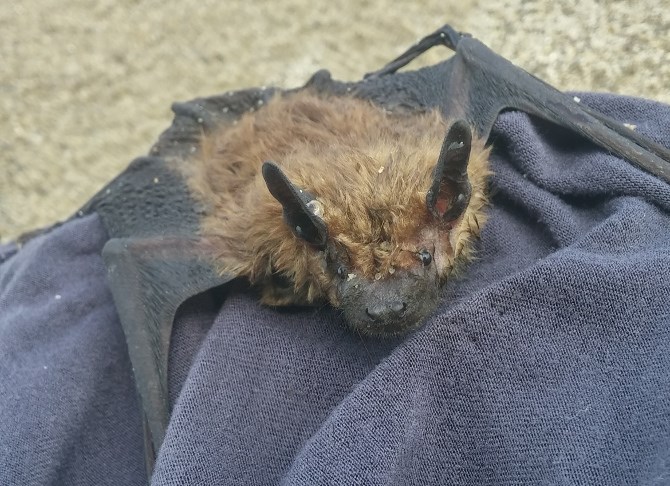
This bat found by a Kamloops woman tested positive for rabies.
Image Credit: Valerie Wilson
August 24, 2016 - 8:00 PM
KAMLOOPS - While people should be always remain cautious around bats, there doesn’t appear to be any increase of rabies in the region, officials say.
In B.C. bats are the only carriers of the notorious disease, with an estimated 0.5 per cent of the population infected, according to the B.C. Centre for Disease Control. While hard statistics are hard to come by, the organization’s public health veterinarians, Dr. Melissa McLaws, isn't aware of an increase.
“We find it in every part of the province every year,” she says. “To our knowledge it hasn’t changed.”
B.C. only had 19 positive tests for rabies between the start of 2014 to the end of 2015, according to the Canadian Food Inspection Agency, which records all positive results for rabies tests in Canada. So far there have been five more recorded in 2016 up to the end of July.
Summer months have typically had more positive tests, with almost half of the cases each year recorded in August alone. In 2015 there were five positive cases and in 2014 there were four. In the Thompson-Okanagan region, media has reported on two people encountering rabid bats this August, including Valerie Wilson who saved a drowning bat that turned out to be rabid. So far the Interior Health Authority has sent four bats for testing this year, with one returning positive.
McLaws says there is an increased watch on for bats right now in general, because white nose syndrome, a fungal infection affecting bats, is spreading across North America and has been confirmed in Washington.
Due to the risk of rabies, public health officials and wildlife experts urge the public to stay away from bats in general. If someone does have a bat encounter, Dr. Moliehi Khaketla, senior health resident with the health authority, says people should contact their doctor or seek medical advice right away. This year 21 people have been treated in the health authority's region as a preventative measure against rabies.
“Generally in Interior Health if someone has been in contact with bats there’s an extremely small risk for rabies,” she says. “But they should make sure they seek health care right away.”
If it’s a high risk situation, she says doctors won’t wait for test results and instead begin treatment as a precaution. She also says people shouldn’t try and capture a bat for testing after an encounter, as grappling with a bat would increase chances for potential infection.
Since rabies can affect any mammal, McLaws says people should make sure their furry pets are up to date on vaccinations. Around half the calls she gets from veterinarians have to do with rabies.
“I get calls every day about cats who’ve caught bats,” she says. “Even indoor cats; I get calls about bats in houses weekly, where the cat catches a bat.”
If an animal is bit by a bat it should be taken to a veterinarian. It’s a bad idea to wait for symptoms, as it’s often too late to treat the disease at that point, McLaws says.
To contact a reporter for this story, email Brendan Kergin or call 250-819-6089 or email the editor. You can also submit photos, videos or news tips to the newsroom and be entered to win a monthly prize draw.
We welcome your comments and opinions on our stories but play nice. We won't censor or delete comments unless they contain off-topic statements or links, unnecessary vulgarity, false facts, spam or obviously fake profiles. If you have any concerns about what you see in comments, email the editor in the link above.
News from © iNFOnews, 2016